Career in IP Management
Career in IP management – a wealth of opportunities and growing demand
Job descriptions and career opportunities in IP management evolve rapidly and are becoming increasingly diverse and demanding.
- Background of the IP profession
- Career prospects and opportunities
- IP Management Ecosystem
- Personal challenges and development
- Tasks, applications and everyday work
- Training and curriculum
- Experience of IP managers
- Impressions from the MIPLM
Background of the IP profession [top]
In the light of the sustainable trends of globalization, the digital transformation of value chains and business models, and the developments related to Industry 4.0, intangible assets are constantly gaining in importance. Entrepreneurial value creation increasingly relies on knowledge-based, intangible resources. The targeted acquisition and use of intellectual property plays a particularly important and increasingly success-critical role in gaining and maintaining a competitive advantage. It is not just the mere existence of such rights which leads to business advantages, but rather the skillful management of such exclusivity positions which turns them into success factors.
Managers are not administrators of the status quo, but have an operational duty to take on entrepreneurial responsibility on behalf of the company’s shareholders. In the light of the above-mentioned conditions of the growing knowledge economy, this also and in particular applies to IP managers. This profit responsibility emerging from the professional, operations-related task of IP management includes especially the optimization of innovations in terms of return on investment through the targeted design and use of intellectual property (IP). Modern IP management is highly market-oriented, integrated into the strategic marketing of companies and often involved in business development, especially with respect to the digital transformation.
With the increasing complexity of IP and the need for new business models in changing markets, there is a growing need for IP managers. In addition to protecting inventions and intellectual/creative achievements, the tasks of an IP manager increasingly include being a point of contact for top management when it comes to integrating IP-based exclusivity positions into a company’s strategy. In contrast to the traditional job descriptions of patent attorneys and patent engineers, that of the IP manager includes all facets of intellectual property rather than being a technical expert on individual rights such as patents. Their area of responsibility is much more market and strategy-oriented, and comprises design competencies, marketing and business model development, rather than just on technology and law.
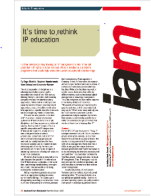 |
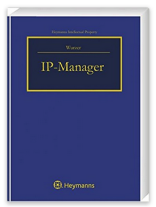 |
|
| „Rethink IP Education“ Article in Intellectual Asset Management Magazine (English) |
Wurzer, A.J. [Hrsg.], IP-Manager, Heymanns, 2009, 505 p. |
Career prospects and opportunities [top]
Job descriptions and fields of activity of IP managers have been evolving for about ten years now and vary significantly across industrial environments. The need for creative minds who juggle innovation, technology, law and the market side, and leverage potentials for companies, is seeing continuous and sustainable growth. These multifaceted prerequisites are often not reflected in traditional job adverts. Professional IP managers have to create and design their own job descriptions in line with the deficits in corporate IP management. IP managers are experts in mediating between disciplines and technical departments, and thus act as enablers of a company’s success by bringing together competencies. Observers of the IP management scene compare these developments with corporate innovation management twenty years ago. This also permits unconventional careers in IP management such as that of Ruud Peters at Philips or that of Marshall Phelps at IBM and Microsoft.
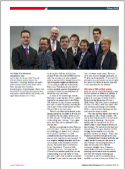 The Philips formula, IP Management at Philips. Ruud Peters was appointed Chief Intellectual Property Officer (CIPO) of Royal Philips in 1999, in which position he was responsible for managing the worldwide IP portfolio, and the technical and formal standardization activities of Philips. In this role, he turned the company’s IP department from a cost center into a successful revenue-generating operation, while at the same time integrating all the different IP activities within various parts of the company into one IP centralized organization. He further developed and introduced a new concept for intellectual asset management, in which all the different forms of IP are handled together in an integrated manner, and advanced methods and systems used for determining the total return on IP investment by measuring direct and indirect profits. Ruud joined Philips in 1977. He retired from his role as CIPO at the end of 2013, but continues to work for the company as a part-time adviser on strategy and IP matters. He is also a board member of a number of technology /IP licensing /trading companies. Ruud has a background in physics (Technical University Delft, The Netherlands). He was inducted into the IP Hall of Fame in 2010 and in 2014 he received an Outstanding Achievement Award for his lifetime contributions to the field of IP from MIP magazine. He frequently speaks at major international IP conferences and also writes articles regularly for leading IP and business magazines. |
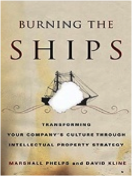 Phelps, Marshall, Burning the Ships: Transforming Your Company’s Culture Through Intellectual Property Strategy, (English), Wiley, 2011, 208p. This book is much about teams and organization to manage IP in a significant companies’ strategy change. It describes what it takes to come from a fortress mentality at Microsoft to an open understanding of the new era and realm of interoperability. It is about how to motivate people, set strategic objectives and implementing cross-functional teams. Marshall Phelps put IP on the corporate map. He forced senior managements to regard IP not as a legal overhead, but as a profit center. He took IBM from a few million dollars in IP-related annual revenues in the late 1980s to over a billion dollars in a little over a decade. At the urging of Bill Gates, he came out of retirement to head Microsoft’s IP strategy and help establish the company as an emerging patent leader, and to expand upon its copyright and trademark successes. |
The IP manager role is interesting for creative minds who do not think in terms of traditional job descriptions and role models. More than ever, companies must focus on market challenges and innovation, and especially on knowledge-based resources. Therefore, IP managers are critical factors for business success.
In recent years, an ecosystem for qualification, training on the job, conferences, literature and seminars has been developed with respect to the IP manager role.
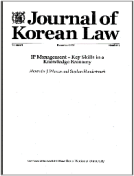
IP Management – Key Skills in a Knowledge Economy, |
IP Management Ecosystem [top]
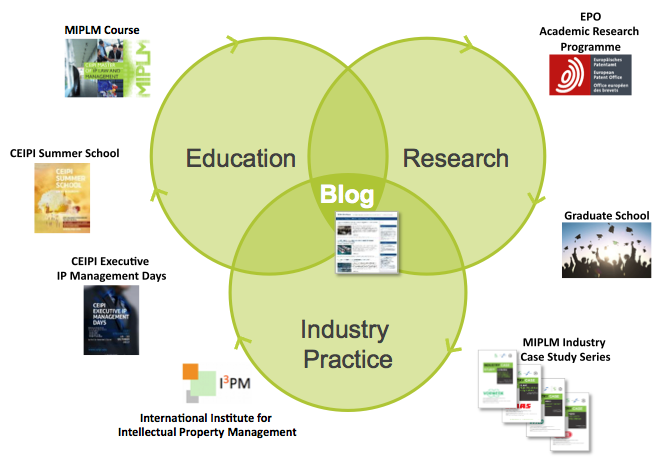
Personal challenges and development [top]
IP managers are characterized by entrepreneurial and independent thinking. In addition to their understanding of technology and IP law, they are able to understand the strategic thinking of top management and contribute their IP knowledge in meaningful ways. The IP manager role also requires creative thinking in terms of business models, innovation projects, marketing strategies and organizational development. Successful IP managers master a variety of domains such as IP design, design thinking, business development, customer and brand experience, etc. They understand the language of their various points of contact within the company, including the R&D, Legal, Product Management, Marketing and sales departments, as well as top management and external service providers such as patent and trademark attorneys, brand and design agencies, technology providers, researchers and trend agencies.
Depending on an IP manager’s qualifications, aspirations and entrepreneurial skills, their career prospects within a company can range from team and department leadership to the management of IP holdings (including profit responsibility) and the management of entire business units.
Tasks, applications and everyday work [top]
An IP manager’s tasks are extremely diverse and depend on such factors as industrial environment, company size and sector. IP management is responsible for developing strategies and integrating IP into business models. This requires the implementation and management of organizational structures, processes and tools for IP management in operational practice. It is the IP manager’s role to support the digital transformation of business models within their company. This may involve the integration, spin-off, centralization or decentralization of business units, acquisitions and disposals of companies, as well as external partnerships such as R&D cooperations, consortia, research associations and joint ventures. IP management is responsible for setting up or integrating subsidiaries abroad, supervising and structuring M&A deals from an IP perspective, and conducting negotiations. IP managers are responsible for developing and supervising the IP portfolio. They generate KPIs for the portfolio and report on them. In addition, they coordinate measures to prevent patent or trademark infringement (counterfeiting). They arrange and perform market and competitive analyses from an IP point of view and monitor the exclusivity of trademarks.
IP managers supervise innovation projects, develop and manage incentive programs for IP portfolio development, evaluate IP and portfolios, design decision-making templates for strategic investments in IP, and support product development, product design and marketing campaigns. They identify and observe trends and derive implications for their company’s own business models.
Training and curriculum [top]
Over the years, both academic and practical training and qualification measures for IP managers have been established. A common prerequisite for all of them is a basic degree, usually a Bachelor’s degree in a technical or business-related subject. But because of the diversity of set-ups in IP management, other career entry options such as patent engineer or patent attorney training are also available.
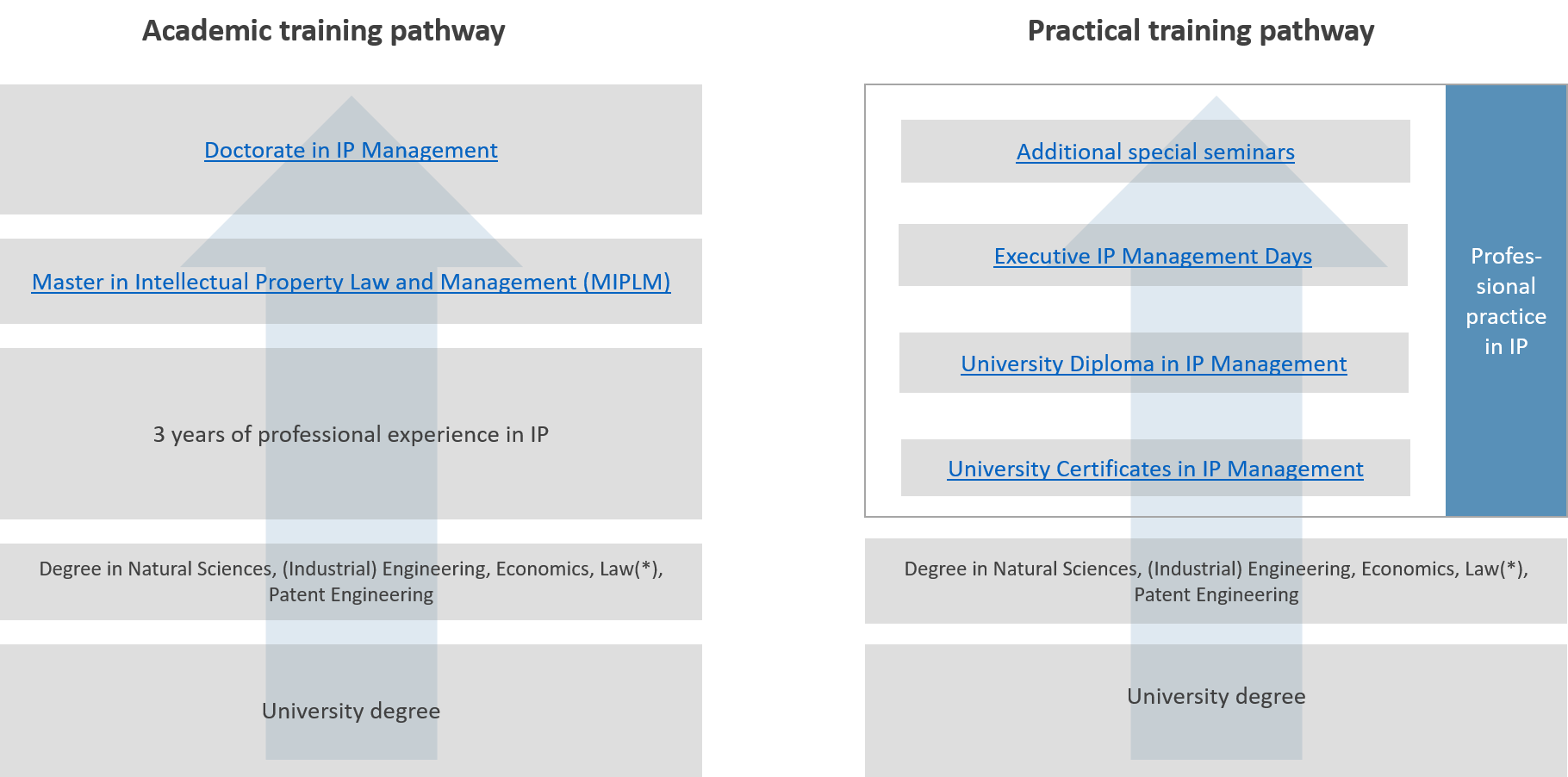
Academic and practical qualification paths are by no means set in stone. Quite frequently, IP managers start out in a practical IP management role, for example at a technology transfer office (TTO), a patent advice center (e.g. CCI) or a patent information center (PIC/Patlib), which they subsequently complement with a Master’s degree or even a doctorate in IP Management.
The admission criteria for the English-language CEIPI Master’s program in IP Management (Master of Intellectual Property Law and Management, MIPLM), for instance, place great importance on practical experience. This degree opens up many career opportunities in IP management, including a part-time doctorate. Like an LLM, the MIPLM is a Master’s degree in Law providing all career options. It is particularly interesting for graduates of Patent Engineering with 3 years of professional experience .
The curriculum of IP manager training programs usually includes topics such as strategy development, valuation, innovation management, organization and leadership, human resource management as well as business development.
Various seminar formats exist for ongoing professional development in IP management. During the Executive IP Management Days at CEIPI in Strasbourg, for instance, the latest IP management case studies and especially the development and protection of digital business models are discussed each year.
Among others, support for research on IP management is available from the Academic Research Programme of the EPO. PhD topics of IP managers range from digital patents and big data-based business models to the protection of brand experiences and patent valuation under FRAND conditions.
MIPLM research projects:
Data-driven business models in healthcare and its regulations limits
IP Strategies for Predictive Maintenance Services
Quality in IP management to improve innovation success for United Arab Emirates
Valuation of FRAND license rates
Experience of IP managers [top]
Experienced IP managers talk about their profession:
Interview with Mr. Dr.-Ing. Thorsten Kettner, (Director Group Innovation) from WILO.
Presentation by Mr. Leo Longauer, IP Manager at Swarovski, Director Global IP Enforcement.
Interview with Dr. Xiaopeng Zhao, Chinese licensed lawyer and Senior Legal Consultant of Chinabrand Consulting, Munich.
Interview with Mr. Dr. Jürgen Eiselt, Head of Patent Department, BLANC & FISCHER Familienholding
Interview with Ms. Kerstin Single, Manager Intellectual Property, Festo AG & Co. KG
Interview with Mr. Dr. Dreyhsig, Vice President, Associate General Counsel IP, Fresenius Medical Care
Interview with Mr. Klaus Gnatzig, Head of IP, Carl ZEISS AG
Impressions from the MIPLM [top]
Case study presentations on the subject of IP management by graduates of the Master of Intellectual Property Law and Management (MIPLM).
Organization & IP Investment Controlling, presented by
- Nelson José Campos, Ministerio de Relaciones Exteriores, Santiago, Chile
- Theoni Fotopoulou, KLC Law firm, Athens, Greece
- François Guette, STMicroelectronics, Rousset, France
- Nora Rehakova, Merck MSD IT Global Innovation Center s.r.o., Praha, Czech Republic
- Alain Werner, SANOFI, Montpellier, France
IP Strategy Development, presented by
- Andrea Crottini, Ecole Polytechnique Fédérale de Lausanne, Lausanne, Switzerland
- Telmo Figueiredo, DUPONT Nutrition Biosciences Aps, Copenhagen, Denmark
- Charlotte Hubert, RENAULT S.A.S., Boulogne Billancourt, France
- Huamei Qui, Ella Cheong IP Agency Company LTD, Beijing, China
- Hendrik M. Rode, Onsagers AS, Oslo, Norway
Brand Management, presented by
- Hiroe Aso, Kyushu Tlo Company LTD, Fukuoka, Japan
- Juan Luis Astray Riveiro, Patent Engineer, Madrid, Spain
- Thomas Lück, Fujitsu Technology GmbH, Munich, Germany
- Bojana Portmann, AC Immune SA, Lausanne, Switzerland
- Alexandre Piurrier, Techip France, Courbevoie, France
- Clara Neppel, European Patent Office, Munich, Germany
________________
(*) Gender note: For reasons of readability, the simultaneous use of male and female language forms is not used in the text. In all mentions of personal fields of activity and job descriptions, both genders are meant.
[top]

